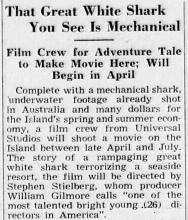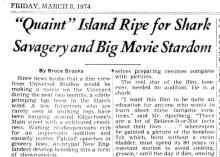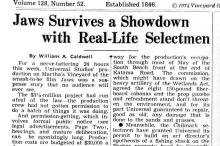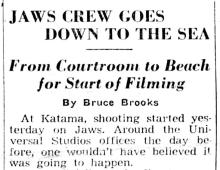The rumors about Jaws suddenly turned ugly three weeks ago. There were no more jokes about sharks being released of the Vineyard — the word was that Jaws was in trouble, even in danger of shutting down, because of horrendous cost overruns. All the whining about the weather from the movie-makers seemed more serious as wild stories about drastic measures circulated. The rest of the film would be shot in Hollywood, some said. A new austerity program might move the crew from the Kelly House to more modest accommodations, others suggested, perhaps to Cranberry Acres campground. Cold-blooded trouble shooters had arrived from California it was reported, to cut down the size of the production.
Islanders close to Jaws handled these tales carefully. The weather has been bad, true, but not that bad. And Universal Studios invested a lot of money in Jaws, too much to just pull out. But they also knew that behind most Island rumors, there is a grain of truth, some event that logically and irresistibly led to bizarre conclusions. What they pinpointed was not a rainy weekend or sea-sick star, but the departure for California of popular, perpetually-sunburned Louis J. “Jim” Fargo, Jaws production manager, and his replacement by his boss, William Gilmore.
Mr. Gilmore, now production executive for Jaws, is virtually immersed in these rumors. He caused many of them, he knows how to refute them better than anyone else, and he must daily battle the problems they imply. He is in charge of production, which means that in the absence of Richard D. Zanuck of David Brown, the producers, he has responsibility for final decisions.
How does he feel about the stories that have reached his ears? “I’m amused,” he said in his office last week, without a trace of a smile. He waved his hand at a bulletin board to the left of his desk bearing a large calendar marking the production’s progress and maps of Cape Cod and the waters off the eastern shores of the Vineyard, and continued, “If you have $3 million dollars invested in a film, and you go over $100,000 when something comes up, you don’t abandon the production. The best thing you can do is to continue to move forward to keep shooting.”
There have been problems, Mr. Gilmore admitted. “The biggest obstacles are the elements — the weather, the seas, and the wind — and the magnitude of the special effects,” he said. Cloudy days and disappointing forecasts have kept the production bottled up day after agonizing day. The original departure date of June 1 — recognized all along as a dream — has nightmarishly become the end of July. That’s an extra two months of $30,000 a day, of increased crowd, tourists and sailboats in the way.
Filming at Sea Difficult
Filming at sea has also slowed progress, and not just because the cast has battled sea-sickness. The special effects and the uncertainty of working on water have been trying. “This might be the most ambitious film ever made,” Mr. Gilmore said. “To emulate a fish is one of the most difficult things you can think of. If you need a bear, you could put a man inside a bear suit and get by. But you can’t do that with a shark.
“To compound that, anything you do with the sea is very difficult. There’s an exactness you need in making movies that’s very hard to attain when boats are drifting out of camera range while you are adjusting something. It can be time consuming and frustrating.”
The frustration that can bee seen in the crew’s faces on the set has not evolved to panic, however. Mr. Gilmore says he checks the weather forecast “only three times a day — morning, noon, and night,” but says its just his job. “I refuse to worry about the weather, and I’m not in a position to worry too much about the special effects,” he said. “I’ve had quite a bit of experience in this industry, and I’ve learned you only worry about the things you can do something about.”
One thing that upset Mr. Gilmore was the rumor that he came to salvage a bungled production, and that Jim Fargo was being banished to small jobs elsewhere after failing on his first assignment. “I want to set the record straight on that right now,” he said. “Jim Fargo did an outstanding job here. He’s moved on to another phase of the picture, which really is quite natural. In fact, he has already been assigned to another Zanuck-Brown picture. If he were in the doghouse, that wouldn’t be so.”
“Somewhat Routine”
Mr. Fargo, he explained, had managed the land portion of the film, which he called “somewhat routine.” Mr. Gilmore himself had maintained a strong hand in the production all along. For example, he had sent the art director to New York to “find” Amity, but the search led to the Vineyard. He made the original contacts on the Island. “People don’t realize that I made seven trips to Martha’s Vineyard before this one,” he said.
This time, though, he is here for the duration. His wife joined him recently, and he flew his two children, a boy, 13, and a girl, 11, in from Los Angeles last weekend. He will produce the sea portion of the film, which he said is much more difficult, and, meanwhile, Mr. Fargo is preparing the underwater footage which will be shot in California.
Mr. Fargo is also dealing with some of the labor unrest within the industry, he added. In addition to demands from the general union of all workers in the entertainment business, Jaws is also threatened by a possible nation-wide strike of the Screen Actors Guild, which will be considered this weekend. “It could put us right out of business,” Mr. Gilmore said. “But it is impossible to speculate right now. They may let pictures more than 60 percent done finish. Who knows?”
One of Mr. Fargo’s duties that remained for Mr. Gilmore is dealing with Island selectmen on “little matters — small headaches that could become big headaches.” For example, Jaws’ contract with the East Chop Yacht Club runs out at the end of the month, and Mr. Gilmore had to go before the Oak Bluffs selectmen last Tuesday to ask for permission to use another site administered by the town. “A lot of the red tape has been disconcerting to some degree,” he said. “The people on the Island are totally unfamiliar with the operation of a movie. It has been a learning process for them, and I think it will be easier for the next movie they make here.”
Deals with the towns to assure that Jaws will have no lasting effect here have added only slightly to the cost overruns. The big offenders are the weather and the special effects. Mr. Gilmore, pushed for an estimate, guessed that the budget might be exceeded by 10 percent. “But that could easily be way off, one way or another,” he added quickly.
“I don’t think there is any way we could end up in the category of The Exorcist, which doubled its budget,” he said. “Our overruns have all been understandable, the result of obstacles not in the power of anyone to control. No one could fault us.
Overruns Expected
“Things are budgeted right if everything goes perfectly. If we were making a bedroom comedy, things would be easier to control. But weather never goes completely right, and with three men in a boat, shooting is going to be difficult under any circumstances. Overruns in this type of picture — a special effects extravaganza — are expected.”
Many of the major expenses and uncertainties of the movie are behind them, he said, but the most difficult shooting remains — the third act fight between the shark and the fishermen. After that is concluded, the production will move back to California to shoot the underwater footage, because of the clearer water and the convenience of nearby studios. Following that will be the editing, scoring, dubbing, and other lab work that Mr. Gilmore hopes will produce a completed movie by January 1, 1975.
The film will probably be released next summer, because gory spectaculars realistically showing a killer fish devouring a women and children are poorly received at Christmas time.
Then and only then will he know if the overruns are serious, Mr. Gilmore says. “You have to wait until the picture comes out,” he explained. “If it is a huge success, all the overruns will be forgotten. If it bombs, even if you underran your budget, it will have been a bad investment. Right now, our main concern — above all the budgeting — is strictly creative.”
“If I had it to do all over,” he continued, “I would still come to Martha’s Vineyard.”











Comments